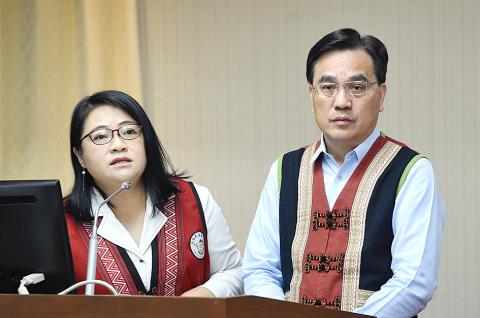Aborigines engaging in exchanges in China should insist on being recognized as Aborigines, and not as “Taiwanese minorities,” Council of Indigenous Peoples Minister Icyang Parod said yesterday.
“I cannot accept our Aborigines being called ‘minorities,’ which does not conform with our nation’s laws,” Icyang told a meeting of the Legislative Yuan’s Internal Administration Committee after he was invited to report on the state of the council.
Icyang also reviewed next year’s annual budget for the Indigenous Peoples Cultural Foundation.

Photo: George Tsorng, Taipei Times
Democratic Progressive Party (DPP) Legislator Chang Hung-lu (張宏陸) said he was not opposed to Aborigines meeting with members of China’s ethnic groups, but they should demand to be referred to as Taiwanese as a prerequisite for participation in such exchanges.
Being called a “Taiwanese minority” is disparaging to Taiwan’s first inhabitants, Chang said.
Having once been called “mountain compatriots” (山胞), Aborigines have endured a long process to be recognized as “Aborigines,” he said, adding that there was now a consensus on this terminology in Taiwan.
Even many of the ethnic groups in China referred to by Beijing as “minorities” are recognized by the UN as Aborigines, but the Chinese government has so far ignored UN convention on the matter, Icyang said.
DPP Legislator Hung Chun-yi (洪宗熠) criticized a statement by Kaohsiung Mayor Han Kuo-yu (韓國瑜), who recently said he supported the idea of putting flag platforms on the peaks of every mountain in Taiwan that is at least 3,000m above sea level.
Hung asked whether the KMT’s presidential candidate had sought the input of Aborigines.
The idea would be destructive to the environment and has already been shot down by Premier Su Tseng-chang (蘇貞昌), who confirmed that no development should take place on mountains considered sacred to Aborigines, Icyang said.
Citing Palau, Chinese Nationalist Party (KMT) Legislator Hsu Yu-jen (許毓仁) said that while Taiwan could not compete with China in terms of generating tourism revenue for Pacific Island nations, of which Palau is one of Taiwan’s four allies in the region, it has a special connection with those nations due to a shared family of Aboriginal languages.
Icyang presented some of the report in his native Amis language, which he said was an implementation of the Aboriginal Language Development Act (原住民族語言發展法) introduced on May 26, 2017.
The act made Aboriginal languages official, and stipulated that public institutions be required to provide official documents in them.
The council also provided written copies of yesterday’s report in Amis and Paiwan — the first time council reports were provided in those languages.

Alain Robert, known as the "French Spider-Man," praised Alex Honnold as exceptionally well-prepared after the US climber completed a free solo ascent of Taipei 101 yesterday. Robert said Honnold's ascent of the 508m-tall skyscraper in just more than one-and-a-half hours without using safety ropes or equipment was a remarkable achievement. "This is my life," he said in an interview conducted in French, adding that he liked the feeling of being "on the edge of danger." The 63-year-old Frenchman climbed Taipei 101 using ropes in December 2004, taking about four hours to reach the top. On a one-to-10 scale of difficulty, Robert said Taipei 101

A preclearance service to facilitate entry for people traveling to select airports in Japan would be available from Thursday next week to Feb. 25 at Taiwan Taoyuan International Airport, Taoyuan International Airport Corp (TIAC) said on Tuesday. The service was first made available to Taiwanese travelers throughout the winter vacation of 2024 and during the Lunar New Year holiday. In addition to flights to the Japanese cities of Hakodate, Asahikawa, Akita, Sendai, Niigata, Okayama, Takamatsu, Kumamoto and Kagoshima, the service would be available to travelers to Kobe and Oita. The service can be accessed by passengers of 15 flight routes operated by

Taiwanese and US defense groups are collaborating to introduce deployable, semi-autonomous manufacturing systems for drones and components in a boost to the nation’s supply chain resilience. Taiwan’s G-Tech Optroelectronics Corp subsidiary GTOC and the US’ Aerkomm Inc on Friday announced an agreement with fellow US-based Firestorm Lab to adopt the latter’s xCell, a technology featuring 3D printers fitted in 6.1m container units. The systems enable aerial platforms and parts to be produced in high volumes from dispersed nodes capable of rapid redeployment, to minimize the risk of enemy strikes and to meet field requirements, they said. Firestorm chief technology officer Ian Muceus said

MORE FALL: An investigation into one of Xi’s key cronies, part of a broader ‘anti-corruption’ drive, indicates that he might have a deep distrust in the military, an expert said China’s latest military purge underscores systemic risks in its shift from collective leadership to sole rule under Chinese President Xi Jinping (習近平), and could disrupt its chain of command and military capabilities, a national security official said yesterday. If decisionmaking within the Chinese Communist Party has become “irrational” under one-man rule, the Taiwan Strait and the regional situation must be approached with extreme caution, given unforeseen risks, they added. The anonymous official made the remarks as China’s Central Military Commission Vice Chairman Zhang Youxia (張又俠) and Joint Staff Department Chief of Staff Liu Zhenli (劉振立) were reportedly being investigated for suspected “serious